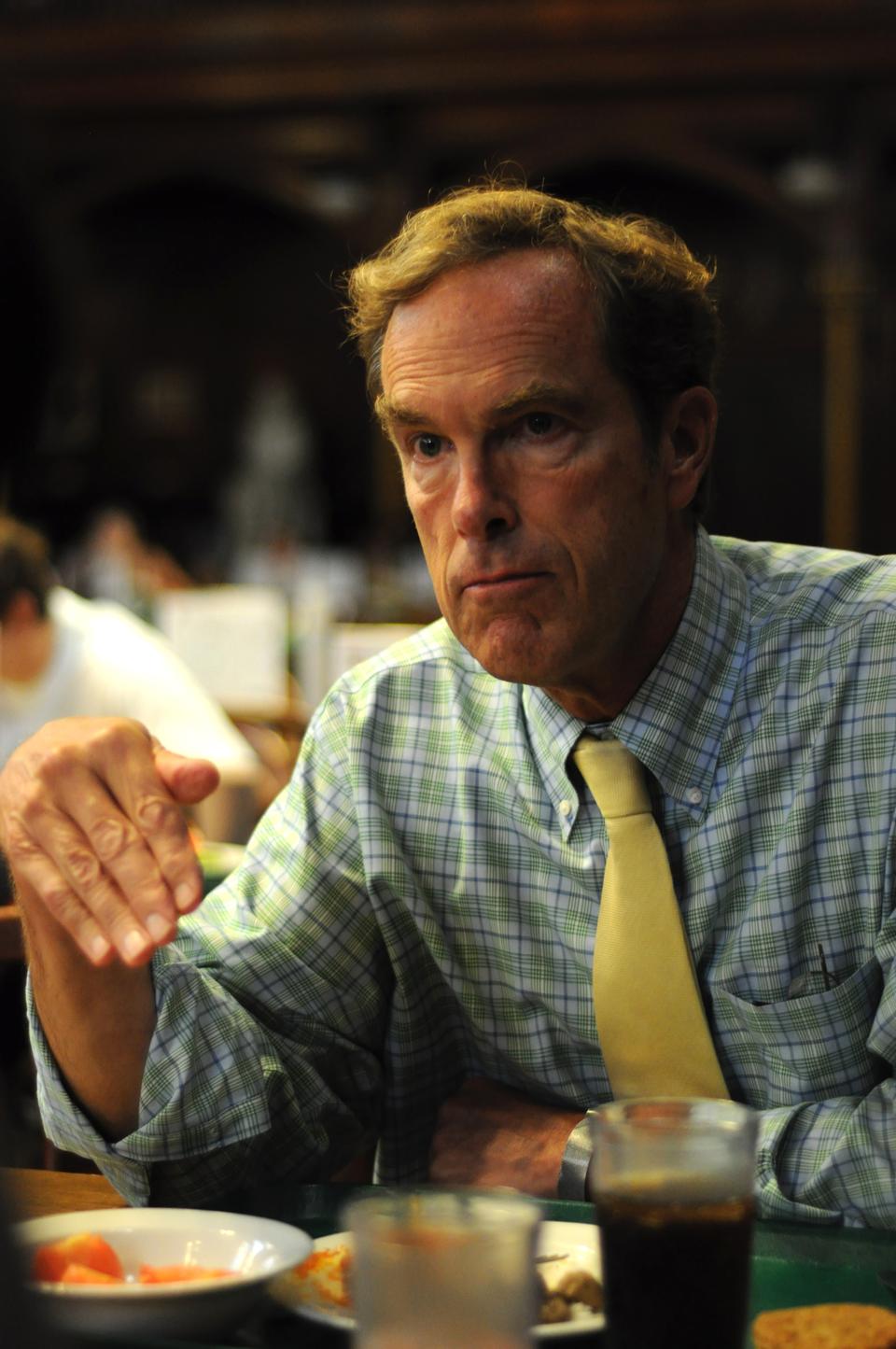
Lunch Break: Thomas A. Dingman '67
A hallmark of the socially gifted, good follow-up questions keep conversations alive and awkwardness at bay—an essential college survival tactic. Dean of Freshmen Thomas A. Dingman ’67 has mastered the art.
On the walk from the Freshman Dean’s Office to Annenberg, Dingman, dressed in olive slacks, green and blue Tattersall shirt, and champagne-colored tie, tosses me a couple of these softballs:
“Where are you from?”
“New Jersey.”
“Where in New Jersey?”
“Near Princeton.”
“Oh, so near Hopewell Valley?”
And so forth.
Tasked with helping freshmen transition to college as painlessly as possible, Dingman knows the importance of setting anxious students at ease. Not only students, though—everyone who runs into Dingman seems to loosen up a bit when he says hello. Walking into Annenberg, he takes a moment to hug a fellow administrator and warmly greets a HUPD officer and Francine, who swipes my ID as I enter the dining hall. “Francine, you don’t know these people by name?” Dingman says, jokingly.
“You know the drill,” Dingman says as we walk past the double doors into the serving area. I don’t see anybody I know as I gather my lunch, but Dingman seems to have something to say to everyone he passes. Scooping mushrooms onto his plate, he turns to a HUDS employee who is wiping debris off the tray aisle. “Freshmen: always making a mess,” he says, which is acknowledged by a knowing nod.
As we chat, Dingman works through his modest meal: the aforementioned mushrooms, two pieces of red spiced chicken, three tomato wedges, rice, a coke (diet, I suspect), and two oatmeal cookies. He has a knife on his tray, but cuts his chicken with his fork.
“This job is pretty 24/7,” Dingman says when I ask him what he does for fun (watch hockey, play squash, spend time with his family). We spend most of the conversation talking about his work, and then his own advising experience when he was a Harvard undergraduate in the 60s.
“During my sophomore year, I went to the History Department to get my study card signed. They told me I could leave my card there over the weekend and I could come back to pick up the signed card on Monday, but that wasn’t really why I was there,” Dingman says. “I was looking for a conversation, not a signature.”
He believes that advising has improved since he was an undergraduate, but notes that he and his team will have to keep trying new things to improve students’ experiences.
“You can’t always get it right the first time,” Dingman says, chuckling, and recalls last year’s widely-publicized incident regarding a new opt-in freshman pledge, which received criticism from some students and faculty. This year, the pledge has been replaced by sensitivity training, including staged skits by students.
When I ask him how many freshmen he meets every year, Dingman doesn’t give me a numerical estimate, but mentions that he becomes familiar with many names as a result of reading through college applications. He isn’t immune to forgetfulness, although when he forgets names, he doesn’t have any special method to recall them.
“I’m not very slick,” he says. “I find that by asking them for their name directly, I can solidify it in my memory.”
Although Dingman seems comfortable talking to just about anyone, he admits that he, like many an Annenberg-going freshman, is susceptible to awkwardness. “Sometimes, I sit down at a table with students whom I don’t know and the conversation just stops. I think it’s more awkward for them than it is for me,” he says.
Just then, a tentative freshman approaches and takes a moment to introduce herself to Dingman. Note the follow-ups:
“Tom Dingman, nice to meet you!”
“Nice to meet you! My name’s Margot.”
“Where are you from, Margot?”
“I’m from Atlanta.”
“Oh, do you know Harrison? I think he’s also from Atlanta.”
And so forth.
Although Dingman has worked at the College for decades in other capacities—as a tutor in both Leverett House and Dudley House—he is inexhaustible. After eight years as Freshman Dean and thousands of names later, he’s always game to learn more.
“Every year feels different because there’s a whole new batch of students, but they keep looking younger as I get more ancient,” he says, flashing a wolfish grin.
By the time we leave Annenberg and start on our separate paths, it’s hard not to acknowledge strangers as regularly and warmly as he does. In fact, the only time I see him ignore a passerby seeking his attention is in front of the Science Center: I sheepishly take a flier from a student advertising free salsa lessons, thinking Dingman will, too. He doesn’t; I feel like a freshman. Walking with his right hand in his pocket and with a slight lean to his right, Dingman continues on with his day, which will undoubtedly involve more meeting and greeting. I’m already a bit weary from keeping up with him, but for Dingman, the job never seems to end.
“Still, I wish I knew more people,” he says.


